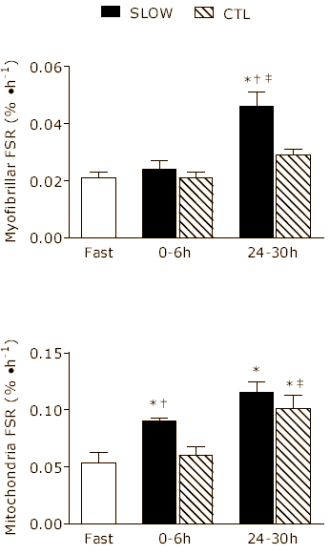Ergo-Log Study: slower reps=more muscle growth
Posted: Wed Jan 11, 2012 8:54 pm
-very interesting study that just came out...muscle "Time Under Tension" seems to be an important factor in muscle growth
The slower your reps, the more your muscles grow
Research done by Nicholas Burd, a sports scientist in the Stuart Phillips stable, may well radically change the way we do strength training in the coming decade. Then again, it might not work. Nevertheless, 'muscle time under tension' looks set to become a familiar concept, and one we can't ignore.
We first reported on Burd's research in the summer of 2010. The subject then was a study in which men who had trained with just 30 percent of their maximal weight – doing 20-30 reps – had built more muscle proteins than men who had trained in the traditional way.
The researchers' theory is that weight isn't the most important factor in strength training, or at least not the only important factor. Equally important is 'muscle time under tension': the amount of time that muscles are placed under tension during weight lifting. Elite trainer Charles Poliquin has been telling that yor years. [charlespoliquin.com]
The researchers will now soon publish the results of their latest study in The Journal of Physiology, in which they subjected the left and right legs of strength athletes to two different workouts. They got the men to train one leg on a leg-extension machine, using weights at 30 percent of their 1RM. The men had to perform the movements slowly, taking 6 seconds for both the concentric and the eccentric movement. The men trained at failure and did 3 sets. [SLOW]
With the other leg the men had to perform the same number of sets, with the same weight. But they performed these movements 'normally' and therefore didn't train at failure. [CTL]
Immediately after the workout the subjects drank a shake containing 20 g whey, and another one 24 hours later.
The workout with the slow reps resulted in the highest muscle protein synthesis – the researchers saw this when they examined cells they had extracted from the leg muscles of the test subjects. This was true for both the contracting myofibrillar protein [the protein in the muscle fibres] and the mitochondrial protein [the cells' power packs]. The latter suggests that strength training with slow reps may be interesting for endurance athletes too.

The figure above shows how slow-rep strength training results in enhanced muscle protein synthesis. Electrode measurements show that the slow-rep sets induced more muscle fibres to be used in the movement.
"These results suggest that the time the muscle is under tension during exercise may be important in optimizing muscle growth", the researchers write. "This understanding enables us to better prescribe exercise to those wishing to build bigger muscles and to prevent muscle loss that occurs with aging or disease."
Perhaps we shouldn't write off the super-slow method just yet…
Here is the study link:
https://ergo-log.com/thesloweryourreps.html
The slower your reps, the more your muscles grow
Research done by Nicholas Burd, a sports scientist in the Stuart Phillips stable, may well radically change the way we do strength training in the coming decade. Then again, it might not work. Nevertheless, 'muscle time under tension' looks set to become a familiar concept, and one we can't ignore.
We first reported on Burd's research in the summer of 2010. The subject then was a study in which men who had trained with just 30 percent of their maximal weight – doing 20-30 reps – had built more muscle proteins than men who had trained in the traditional way.
The researchers' theory is that weight isn't the most important factor in strength training, or at least not the only important factor. Equally important is 'muscle time under tension': the amount of time that muscles are placed under tension during weight lifting. Elite trainer Charles Poliquin has been telling that yor years. [charlespoliquin.com]
The researchers will now soon publish the results of their latest study in The Journal of Physiology, in which they subjected the left and right legs of strength athletes to two different workouts. They got the men to train one leg on a leg-extension machine, using weights at 30 percent of their 1RM. The men had to perform the movements slowly, taking 6 seconds for both the concentric and the eccentric movement. The men trained at failure and did 3 sets. [SLOW]
With the other leg the men had to perform the same number of sets, with the same weight. But they performed these movements 'normally' and therefore didn't train at failure. [CTL]
Immediately after the workout the subjects drank a shake containing 20 g whey, and another one 24 hours later.
The workout with the slow reps resulted in the highest muscle protein synthesis – the researchers saw this when they examined cells they had extracted from the leg muscles of the test subjects. This was true for both the contracting myofibrillar protein [the protein in the muscle fibres] and the mitochondrial protein [the cells' power packs]. The latter suggests that strength training with slow reps may be interesting for endurance athletes too.

The figure above shows how slow-rep strength training results in enhanced muscle protein synthesis. Electrode measurements show that the slow-rep sets induced more muscle fibres to be used in the movement.
"These results suggest that the time the muscle is under tension during exercise may be important in optimizing muscle growth", the researchers write. "This understanding enables us to better prescribe exercise to those wishing to build bigger muscles and to prevent muscle loss that occurs with aging or disease."
Perhaps we shouldn't write off the super-slow method just yet…
Here is the study link:
https://ergo-log.com/thesloweryourreps.html